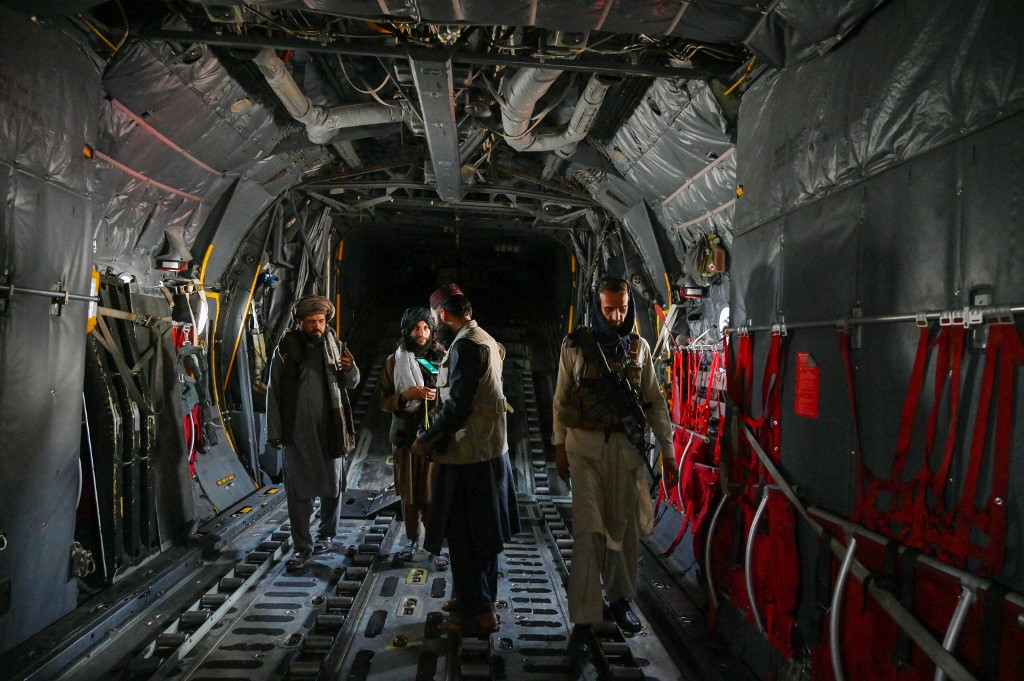Foreword

Taliban fighters walk inside an Afghan Air Force aircraft at the airport in Kabul on August 31, 2021, after the US removed all troops from the country to end two decades of war. The Taliban takeover marked a sharp regression of Afghanistan’s media industry, rolling back the hard won progress made during that time. Credit: Wakil Kohsar / AFP
Two decades of intensive development and immense financial investment in Afghanistan’s democracy seemed to collapse like a house of cards before the world’s eyes in August 2021 as the country fell into the hands of the Taliban.
With that calamitous fall, so too crumbled thousands of media careers, the hopes and personal sacrifice of a nation of passionate and committed men and women journalists, media unions and other advocates and activists for freedom of expression.
In the frenzy of those first few days after the Taliban marched into Kabul, and as media support organisations like the IFJ and so many others tried vainly to help support and evacuate a seemingly endless legion of devastated and terrified media workers, came the inevitable thoughts. How could this happen? How can so much work, so much time, suddenly amount to so little?
The steady march of the Taliban across the country in the months preceding, taking out media with it, sending journalists fleeing, was surely a sign of what was to come as soon the US ended its mission? And yet most were unprepared.
With a world weary from the Covid-19 pandemic and of a mission that had become politically unpalatable, stepping away from Afghanistan might have seemed a simple task to some.
But it wasn’t. And for the sake of our Afghan media colleagues, it can never be.
The bitter irony is that this tragedy for press freedom unfolded during the 20th year of the IFJ’s South Asia Press Freedom Report – a report that launched this organisation’s hopes for a new media dawn in that country. Let us never forget that this is an industry that had propelled itself at light speed to become a thriving and vibrant example of the capabilities of journalism to shine light and empower so many.
So, it is fitting then that this year’s South Asia Press Freedom Report, Strength and Solidarity: The Story of South Asia, documents the challenges of our Afghan colleagues as they faced their professional reckoning. It also tells the story about the importance of solidarity in times of need.
In other countries too, there is fierce resistance. Right now, our colleagues in Sri Lanka are immersed in the immense political protests against the economic crisis in that country. In Nepal, Pakistan, Bangladesh, Maldives, Bhutan and India, our colleagues are standing united to stop aggressive controls and clampdowns on digital media and press freedom – and they are winning important cases against difficult odds.
During this time of pandemic and hypervigilant governance, we’ve seen more violations against the media – 210 recorded by the IFJ, including 23 journalist lives lost. And we’ve also witnessed the propensity of governments and the state to pursue journalists into silence through intimidation, interrogation, detentions and arrests. In the period, IFJ recorded 131 cases of journalists detained or jailed in South Asia, a dramatic increase on the 63 arrests recorded this time last year. As we publish, 30 journalists remain behind bars.
This year we look at the big issues for South Asia – the outcomes for journalists in exile, the battle being waged to keep the digital space open and, importantly, the way that media is transforming and growing out of the ravages of the pandemic to find sustainability and new ways of telling the stories of this diverse region.
Importantly, across our region, journalists are standing together to fight for survival in uncertain times. Each country report details the specific challenges and the vigorous responses being led by brave journalists.
Nowhere is more uncertain than Afghanistan, where three quarters of media houses have closed, where women have been pushed out of their profession and thousands of media workers rendered jobless, homeless and also stateless. And yet, there remain journalists and their unions prepared to fight on, to stand up and negotiate a future for media.
As media defenders and defenders of our right to free expression, Afghanistan is a critical story of South Asia that we have a responsibility to tell.
Jane Worthington
Director
IFJ Asia-Pacific
